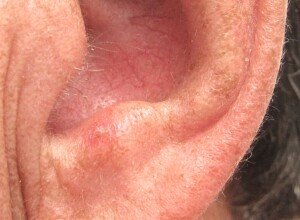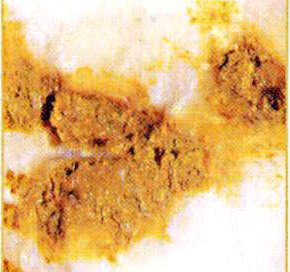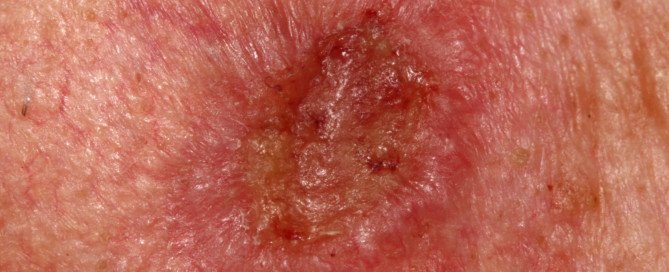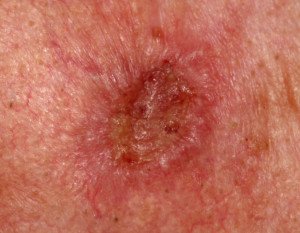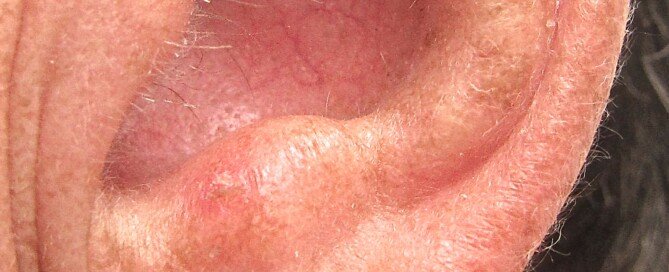How Does Acid Reflux Cause Upper Back Pain?

Upper back pain has causes ranging from acid reflux to heart problems to a number of cancers.
Most back pain is caused by a musculoskeletal issue.
But for many people, acid reflux is behind their upper back pain. How is this possible?
“When acid is absorbed into the lining of the esophagus it can irritate nerves such as the vagus,” says Andrew Black, MD, Diplomate of the American Board of Internal Medicine & Gastroenterology who’s based in Norman, OK.
“The pain signals travel to the brain on some common conduits which can also be used by other parts of the body (chest, back etc.), thus creating the sensation of pain arising from those areas.”
If back pain is sudden and searing, this would not be caused by acid reflux, but more likely a compressed nerve in the spine.
If back pain that’s sudden and severe occurs while you’re lifting or straining physically, then you can attribute this to a spasming or overloaded muscle.
However, back pain from lifting usually occurs in the lower portion.
However, if really bad back pain occurs in conjunction with chest pain, and especially also with nausea, sudden sweating and/or shortness of breath, this can signal a pending heart attack or one about to occur. Get to the ER.
Ripping or stabbing back and chest pain can signal a dissection of the heart’s aorta, which supplies blood to the body.
Don’t waste a second getting to an emergency room.
Acid Reflux and Upper Back Pain
Pain in the upper back caused by acid reflux would not be persistent; it would come and go (often related to eating certain foods) and also often be accompanied by heartburn or a slight burning sensation in the upper abdomen.
The symptoms would not be relieved by rest, since they are caused by the stomach’s acidic contents refluxing up the esophagus.
And here’s something to consider: It’s entirely possible to have two unrelated conditions that are causing your upper back pain:
One may be acid reflux and one may be any number of other conditions that can cause discomfort in the back, including some cancers.
Upper Back Pain from Cancer
Pain in the upper back from cancer can be caused by tumors affecting the spine, ribcage or surrounding tissues.
It might also result from a cancer that has spread. Tumor growth or spinal cord compression can lead to sharp, persistent pain.
Additionally, inflammation from cancer or its treatment can contribute to upper back pain.
You need to see your doctor if the discomfort or aching in your back persists despite trying conservative measures to eliminate it.
 Dr. Black has presented many GI-related research papers at national conferences. He is an active member of Norman Regional Hospital, and West Norman Endoscopy Center.
Dr. Black has presented many GI-related research papers at national conferences. He is an active member of Norman Regional Hospital, and West Norman Endoscopy Center.
 Lorra Garrick has been covering medical, fitness and cybersecurity topics for many years, having written thousands of articles for print magazines and websites, including as a ghostwriter. She is also a former ACE certified personal trainer.
Lorra Garrick has been covering medical, fitness and cybersecurity topics for many years, having written thousands of articles for print magazines and websites, including as a ghostwriter. She is also a former ACE certified personal trainer.
.
Top image: Shutterstock/Kaspars Grinvalds
Drinking a Lot of Water Causing Diarrhea: Solutions

Does drinking a lot of water give you diarrhea?
First of all, find out just how much water you’re drinking.
You may find that you’re taking in much more than you really need to.
Don’t mindlessly guzzle water to the point of frequently feeling bloated and making endless trips to the toilet.
You may be overestimating what “eight glasses a day” really should be. One glass is eight ounces. A tall glass is more than eight ounces.
Eight ounces = one cup, like a standard coffee cup. Two of these can fit into a typical tall glass.
To ensure you’re getting “eight glasses” a day (and certainly, nobody ever got sick by drinking only six glasses of water a day), fill a pitcher with the precise amount every morning.
Then drink your water entirely out of that pitcher. This way you won’t have to keep track of anything throughout the day. See if this helps calm your diarrhea.
If eight glasses (64 ounces or half a gallon) of water on a daily basis continue to give you diarrhea, you should see what happens by cutting back a glass or two.
Fill the pitcher with six, maybe even five cups’ worth. Give this plan several days to kick in.
Another Tactic to Try
“If one is experiencing loose stools due to high volume but not unreasonable water intake, try soluble fibers such as Benefiber/FiberCon, etc., to absorb some of the liquid,” recommends Andrew Black, MD, Diplomate of the American Board of Internal Medicine & Gastroenterology who’s based in Norman, OK.
If diarrhea continues, maybe it is not water intake that’s causing it.
You may have irritable bowel syndrome, microscopic colitis (a benign condition characterized by messy diarrhea) or some other condition.
Diarrhea may also be from very high fiber intake, but it should not be happening on a frequent basis.
 Dr. Black has presented many GI-related research papers at national conferences. He is an active member of Norman Regional Hospital, and West Norman Endoscopy Center.
Dr. Black has presented many GI-related research papers at national conferences. He is an active member of Norman Regional Hospital, and West Norman Endoscopy Center.
 Lorra Garrick has been covering medical, fitness and cybersecurity topics for many years, having written thousands of articles for print magazines and websites, including as a ghostwriter. She’s also a former ACE-certified personal trainer.
Lorra Garrick has been covering medical, fitness and cybersecurity topics for many years, having written thousands of articles for print magazines and websites, including as a ghostwriter. She’s also a former ACE-certified personal trainer.
.
Top image: Shutterstock/sasha2109
Can Grape Juice Cause or Aggravate GERD?

Don’t you just love grape juice, with its intense sweet flavor, but at the same time it seems to cause or at least aggravate GERD: gastroesophageal reflux disease. (more…)
Middle Age Women Who Sit a Lot at Risk for Future Frailty

If you’re a middle age woman who sits many hours a day, you’re at risk for becoming frail and weak later on, yet this is just SO preventable. (more…)
Do You Suffer from Bloating After Eating? Causes and Solutions

There are many causes of bloating after meals or eating, but you need not suffer with this uncomfortable situation.
To avoid bloating after eating, here are steps to take.
First off, make sure that you notice the bloating only after eating, rather than during times when food can’t possibly be a cause.
There are many medical conditions that cause either a sensation of bloating or actual bloating (e.g., fluid buildup in the abdomen).
But many people feel bloating that is directly related to eating.
“Everyone has different foods that their body may not tolerate well,” says Walter Gaman, MD, FABFM, board certified in family medicine and the author of several award-winning books including “Age to Perfection: How to Thrive to 100, Happy, Healthy, and Wise.”
“Get to know your body and avoid foods that cause distress or bloating.
“For some, this may be dairy, even lactose-free dairy, because of the proteins in the dairy products.
“Others may have issues with vegetables like onions, cabbage or broccoli.”
More Ways to Avoid Bloating After Eating
Avoid carbonated beverages. The carbonation will give you a gassy bloated feeling, even if you sip slowly.
Replace with the best drink you can have with meals: water. This may not seem exciting, but a glass of very chilled water will soon become quite appealing with food.

Freepik.com
Avoid gulping air while eating and drinking. This causes gas in the abdomen.
Avoid talking while chewing. Not only can this cause gas buildup in your stomach, but it’s very unsightly to anyone who’s eating with you.
No conversation is so important that you can’t wait till all the food in your mouth is swallowed before you begin speaking.
Watch per-meal fiber intake. A diet high in fiber is healthy for the gut, but make sure not to cram a lot of your daily fiber quota into one meal. Try to spread it out throughout the day.
Keep a food diary. See if maybe there’s a particular food that you have often that might be making you feel bloated after eating it.
This could signal a food intolerance or allergy. Remove any suspected foods from your diet and see what happens.
Do this one food at a time to accurately keep track. Prime culprits are gluten-containing foods.
Restrict fattening foods. Go easy on the butter and gravy. Cut back or avoid anything with saturated fats.
Exercise after your meal. No, not an all-out gym fest, but do yoga, walking or a neighborhood bike ride for 30 minutes.

Freepik.com/yanalya
Heartburn treatment. If you’ve been diagnosed with heartburn, make sure that ongoing treatment is underway.
Acid reflux can contribute to a feeling of bloating after meals. Keep in mind that acid reflux, if caused by chronic anxiety, can be treated by learning how to manage your stress levels.
Dr. Gaman also advises, “Remember that not all bloating and gas come from beans. A good tip for reducing bloating is to drink some freshly squeezed lemon juice with your meals.” Sweeten it with Stevia, a natural zero-calorie sweetener.

Dr. Gaman is with Executive Medicine of Texas and is with the Staying Young Radio Show 2.0 podcast.
 Lorra Garrick has been covering medical, fitness and cybersecurity topics for many years, having written thousands of articles for print magazines and websites, including as a ghostwriter. She’s also a former ACE-certified personal trainer.
Lorra Garrick has been covering medical, fitness and cybersecurity topics for many years, having written thousands of articles for print magazines and websites, including as a ghostwriter. She’s also a former ACE-certified personal trainer.
.
Top image: Shutterstock/Inspiration GP
Can Gallbladder Removal Cause Heartburn?

Removal of the gallbladder (cholecystectomy) can cause heartburn due to reflux.
It’s even possible to suffer this heartburn up to four months after gallbladder removal.
For some patients, gallbladder removal is the end of troublesome symptoms – as they are perfectly fine after that.
Other patients, though, have continuing problems, and one of these is acid reflux.
In a study by Jazwari et al, 13 out of 37 people who’d had their gallbladder removed were still experiencing problems as far out as four months.
The 13 patients had had abnormal pH levels in the esophagus before their surgery, but following the cholecystectomy their pH level jumped on average by 73 percent.
How did gallbladder removal cause heartburn in these patients?
The conclusion by the study authors was that there was a compromised sphincter.
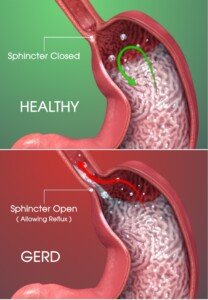
Scientific Animations, CC/BY-SA/Attribution-ShareAlike 4.0 International
The sphincter is the structure whose job it is to prevent stomach contents (which are acidic) from refluxing up the esophagus.
A weak sphincter will let stomach contents travel up the esophagus. Some causes are as follows:
• Gastroesophageal reflux disease (GERD)
• Hiatal hernia
• Obesity or abdominal pressure
• Pregnancy
• Aging-related muscle weakening
• Smoking
• Alcohol
• Certain foods (fatty, acidic, chocolate, caffeine, peppermint)
• Medications (anticholinergics, calcium channel blockers, nitrates, benzodiazepines)
• Diabetes-related nerve damage
• Neurologic disorders (e.g., Parkinson’s disease, stroke)
• Chronic vomiting or retching
This weakening is what causes heartburn, upper abdominal pain, coughing and other symptoms associated with acid reflux.
 Lorra Garrick has been covering medical, fitness and cybersecurity topics for many years, having written thousands of articles for print magazines and websites, including as a ghostwriter. She’s also a former ACE-certified personal trainer.
Lorra Garrick has been covering medical, fitness and cybersecurity topics for many years, having written thousands of articles for print magazines and websites, including as a ghostwriter. She’s also a former ACE-certified personal trainer.
.
Top image: ©Lorra Garrick
Source: onlinelibrary.wiley.com/doi/10.1002/bjs.1800800119/full
Is Estrogen Connected to Microscopic Colitis?
It is suspected by some women with microscopic colitis that estrogen might somehow be involved with this uncommon inflammatory bowel disease. (more…)
Is Walking Enough Exercise to Control Type 2 Diabetes?
Walking may or may NOT be enough to control type 2 diabetes. It depends on how you do it. (more…)
What Percentage of Actinic Keratoses Become Squamous Cancer?
There’s a percentage range of actinic keratoses turning into squamous cell carcinoma, which is why these seemingly harmless skin lesions should never be ignored.
Furthermore, the appearance of very early squamous cell carcinoma can mimic actinic keratosis.
“The lifetime risk of actinic keratosis to progress to squamous cell carcinoma is two to five percent,” says Vishal Madan, MD, consultant dermatologist, laser and skin cancer surgeon, and founder/director of Everything Skin Clinic™.
Dr. Madan explains, “Small flat actinic keratosis may never progress to squamous cell carcinoma, while a tender, thick, hyperkeratotic AK has a higher risk of progression to SCC — especially if there are other risk factors such as immunosuppression, previous history of SCC or severely sun damaged skin.”
The Journal of the American Academy of Dermatology (Callen et al) states, “Estimates of the percentage of these chromosomally abnormal skin lesions that convert to squamous cell carcinoma vary from 0.25% to 20% per year for an individual lesion.”
The paper continues, “It is impossible to predict accurately in which patient a squamous cell carcinoma will develop.”
The percentage ranges may be broad, depending on the particulars of an investigative study.
Nobody really knows an exact percentage, since studies do not round up people with actinic keratoses and then instruct them never to get these precancerous lesions treated and then follow them for the rest of their lives.
What’s known for sure is that the percentage is small rather than significant, but high enough that people with actinic keratoses should get these lesions removed, even if it takes multiple attempts.
They are removed via either a spraying directly onto the lesion with frozen nitrogen, or a prescription cream applied directly onto the lesion.
“Actinic keratoses must be treated to prevent their conversion to squamous cell carcinoma,” continues the JAAD paper.
If you’ve been diagnosed with actinic keratosis, then it’s a no-brainer: Get them treated — even if they aren’t that visible.
AK’s grow very slowly and may be much more progressed before you even know it.
You don’t want to be in that small percentage whose actinic keratoses transforms into a malignancy.
The cancer will never be melanoma; it’s squamous cell carcinoma.
However…SCC can be fatal – because it will metastasize if not treated.
Don’t confuse SCC with basal cell carcinoma, for which metastasized cases are exceedingly rare – and only then, due to neglect.
Actinic keratosis are extremely common.
This is why many dermatologists have a canister or two of liquid nitrogen (cryotherapy) sitting on their office desk, ready for use.
You may have a few lesions right now and not even know it.
This is why (in addition for melanoma screenings) you should have a clinical skin exam by a dermatologist every year.
AK’s can mimic seborrheic keratoses. Do not self-diagnose. See a dermatologist.

Specializing in the diagnosis and treatment of all skin conditions including melanoma, Dr. Madan has a special interest in skin cancer treatment, including Mohs micrographic surgery for basal cell carcinoma.
 Lorra Garrick has been covering medical, fitness and cybersecurity topics for many years, having written thousands of articles for print magazines and websites, including as a ghostwriter. She’s also a former ACE-certified personal trainer.
Lorra Garrick has been covering medical, fitness and cybersecurity topics for many years, having written thousands of articles for print magazines and websites, including as a ghostwriter. She’s also a former ACE-certified personal trainer.
Top image: Shutterstock/Dermatology11
Source jaad.org/article/S0190-9622(97)70265-2/abstract
Panicking Over a Diagnosis of Actinic Keratosis?
